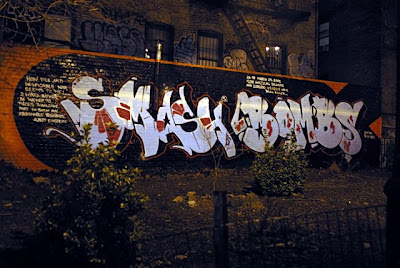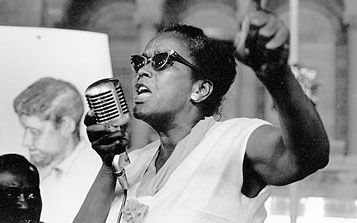So the “national dialog” on race has begun. Here is a HILARIOUS take on it.
Thanks to Atlasien on Rachel’s Tavern for posting it first.
So the “national dialog” on race has begun. Here is a HILARIOUS take on it.
Thanks to Atlasien on Rachel’s Tavern for posting it first.
Okay, so this video is pretty funny, it’s from SUPERDELUXE. It made smile.
I’m sort of in a different mood today. I could tell from the first time I woke up that I’d be moving and thinking a little different. For a couple of moments now I’ve been caught up in nostalgia of the past, but I know that the past is just that. As I was looking at HarlemWorld the other day I saw that reality. It was recently announced that Harlem will be the new home to a luxury car dealership. I had to pause and think for a while about it. Think about it, not just about gentrification, I know all about that. In fact, I’ve put some of my feelings out there already.
But really what does it mean to live in a place where the poor and the rich meet, but never really meet? NY is gotham city, it is the place where race, class, and reality have to come together, but somehow never do. It’s almost a dream world. As I thought about this, I could hear the Blondie and KRS mash up (yeah, we didn’t call it that when it came out but that’s what it would be called now) Step Into a World. The airy vocals of Deborah Harry of Blondie, the chanting and braggadocio of KRS collide to capture a sound clash. But it’s the clash that’s beautiful and slightly cacophonous, full but empty? It’s all there, but something is missing. In many ways, it’s almost like the 80s in redux.
While it’s easy to talk about progress and distress, in reality, people are at the center of these battles between development, renewal, and changes. In many ways the only thing left are our memories, but what happens when memories fade? What happens when the place you want to take someone to remember is no longer there? How do we create new memories? Can we really even “create” memories?
My job as a professor really gives me a great opportunity to talk to folks about the sociology that we live through everyday. This past week in my Sociology of the African-American Experience we had some involved conversations about Black men, unemployment, and culture. We, like good sociologists, talked about the structural issues associated with getting ahead, the cultural dimensions of what it takes to keep jobs, and the ways employers view urban Black men. The conversation was maginificant, but when I asked students what could be done to shift Black men’s employment opportunities, it felt like all our suggestions were like tossing starfish into the ocean one by one. That however is not the biggest issues of when the sociological becomes personal, it is when we have to individually make sense of larger sociological problems like unemployment, etc.
This morning I was leaving the train station and watched a man struggle down the steps with a large suitcase. As he descended the stairs clumsily, I saw a man about 45 or so begin to descend next to him, but not heading down the stairs. As I watched, the second man reached his hand into the pocket of the man with the suitcase. For a minute the men were so close I thought, wait they must know each other. Then the man with the suitcase felt his hand and looked over and noticed it was a pickpocket attempt. Immediately the man with the suitcase was like, “Hey!” and took the other man’s hand out of his pocket. The guy who was attempting the pickpocket buzzed down the steps and tried to divert attention by yelling, “Don’t block the stairs again man!”
As an onlooker I had like ten things going through simultaneously.Here were a few, “what would I have done if it was my pocket?” I wondered, “Why didn’t you say anything?” “Should you call the cops?” “What good would calling the cops do?” When the issues of the world become personal, are we able to understand and contextualize behavior or do we go back to saying folks who do crime, etc. are just deviant? It’s too easy to dismiss the situation and suggest that the offender is just a bad apple. It’s also too simple to say that there are no jobs. In both cases, we know NOTHING about the life of the guy who attempted the pickpocket. But I think when things become personal, we too easily forget about the context that informs the behaviors folks employ to “make it.” In many conversations among friends and colleagues, over the years, I’ve heard folks provide context to all sorts of actions but when it came to their personal well being being threatened discussions began to sound like AM talk radio. When the sociological becomes personal, what is your first reaction… and your second?

Well, once again, I’m moving. I’ve finally got my url all set up over at www.uptownnotes.com. Also check out my more professional side at www.professorlewis.com
I’ll migrate the other posts over at some point. When I do that, I’ll activate the redirect script.
The video beneath is powerful, truthful, and only 8 and a half minutes. Please watch.
It is an adaptation from Howard Zinn’s new graphic novel A People’s History of Empire. Yeah, that’s right, Zinn has a graphic novel. I think his commentary is quite appropriate given King’s speech on April 4th, 1967.

Inevitably April 4th will be marked all over the internet with folks interpreting King’s legacy. I look forward to reading these reflections, but I can’t help but find it ironic that we are able to tap into his true legacy more on his death then on the day that he has a nationally recognized holiday. As we contemplate a national holiday for another American giant, the issue of co-optation looms large. While it is beautiful to celebrate King’s legacy on the day that he was taken from us, it would be even more beautiful to take back his holiday to its true meaning.
Part of the reason that I think the holiday has become such a thorn in the side to folks with progressive politics is that Martin’s legacy has been distilled, sanitized, and re-packaged to be comfortable. There was nothing comfortable about what he called for and there was little that was popular about his opinion. Remember, just days after the March on Washington, four little girls lost their lives in Birmingham. But that will never make it in a McDonald’s commercial. That will never be the subject of a school play. But how do we remind folks, particularly Black folks, that Dr. King embraced a radical tradition, a tradition of challenge, a tradition of forgiveness, and a tradition of change?
For me, it starts with shattering myths that suggest we have reached the mountain top. It continues by entering the difficult conversations about race and poverty. These conversations will involve not only talking about structure but also how our own individual actions contribute to everyday inequality.It moves towards King’s vision when it goes from our heads to our hearts then to our hands.
Recently I had the opportunity to appear on the O’Reilly factor to discuss the comment of Rev. Jeremiah Wright. While my appearance was short, I got a lot of really positive feedback (one negative comment to date). What is most interesting to me about the controversy of Wright’s comments is the degree to which the media will continue to fan these comments into the public eye. The comments by Wright, which were not new, were recently catapulted to the national spotlight. After a disavowal of Wright, a public speech, and a kajillion news stories, there is still this sick media fascination with bringing up the Jeremiah Wright issue. Clearly it’s become the media’s version of the Boogie Man for Obama’s campaign. While I think it is important for this matter to be discussed, I think it’s been given more than its fair share of media attention. We’ll soon be nearing a month. Can we give it a rest, I’m sure the folks who have made the decision to hate Obama for an affiliation with Wright are no longer even listening. I’m sure the folks who are supporting Obama are no longer even listening. And for the undecided, I wonder why you would be listening to a soundbyte from someone who is not Barack Obama. Can we stop fanning the flames already?
So after moving across country, migrating my old blogs around (BlackatMichigan and Dumi Says) I’ve finally found a home. Thanks for all that have been bearing with my moves and been following my writings, rants, and commentaries. If you’re reading this you’re part of a special club. Unfortunately I don’t have any cool decoder rings to give you, but it’s the thought that counts anyway, right? If you’re reading this you’ve been in the know about my intellectual and social development or were recently turned onto my perspective. Uptownnotes is my new web home where I’ll vet ideas, request insights, and give you a look from my point of view.
What’s in a name?
Basically, I’m in New York City but I spend most of my time uptown. I work, live, and play where the yellow cabs don’t usually come. While I like to check out other folks‘ perspectives on the city, in reality, I tend to see things from a different point of view. So I look forward to bringing you some sketches of my uptown notes.

For more images of upper Manhattan rarely seen check out InwoodPix.
This past week I had the opportunity to listen to Vincent Harding who is truly a living gem. He reminded me of many things, not the least of which was Ella Baker. After hearing multiple reactions to the debates and other discussions of Black leadership, I’m going to post a couple of thoughts here about leadership and Black folks. First, two scoops of Ms. Baker,
“I have always felt it was a handicap for oppressed peoples to depend so largely upon a leader, because unfortunately in our culture, the charismatic leader usually becomes a leader because he has found a spot in the public limelight. . .”
“There is also the danger in our culture that because a person is called upon to give public statements and is acclaimed by the establishment, such a person gets to the point of believing that he is the movement.”
Next is a excerpt from last year’s State of the Black Union by the legendary Julia Hare as she breaks down Black relationships, leaderships, and a bunch of ish.